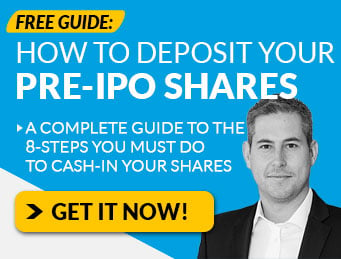Glossary
As converted
When used in a context of a liquidity event, as converted means when preferred stock is converted to common stock in a 1 for 1 value.
A Syndicate
Allows for a group of investors to participate in a lead investors deal.
Accredited Investor
An Accredited Investor as defined by the Securities and Exchange Commission (SEC) in Rule 501 of Regulation D, is a Person or Entity whose level of financial sophistication warrants a reduced need for protection provided by regulatory disclosure filings. The SEC’s Accredited Investor concept is to identify Persons or Entities who can bear the economic risk of investing in unregistered securities. You are deemed an Accredited Investor if you are a Person who meets one of more of the following criteria: You have a net worth over $1,000,000, either alone or jointly with your spouse (excluding the value of your primary residence) at the time of purchase OR You have an earned annual income equal or exceeding $200,000 , or $300,000 jointly with your spouse, in each of the two years prior to the time of purchase and reasonably expect the same income for the current year. Entities such as Banks, Insurance Companies, Trusts, Corporations and LLC may be considered accredited if: Assets under management are equal or greater to $5,000,000, not formed to specifically purchase the securities offered, whose purchases are directed by a sophisticated person OR Any Entity which all principal equity owners are Accredited Investors.
Alternative Assets
Angel Investor
An Angel Investor is an Individual who provides capital for a new business or entrepreneurial endeavor. Traditionally, an Angel Investor will receive equity or convertible debt for their financial contribution. An Angel investor is focused on growing or launching a business rather than seeking a short term return on investment. Angel Investors can also be called Angel Funders, Business Angels, Seed Investors.
Angel Round
Represents the money that is invested into a company usually by an affluent individual who believes in the vision of the company or its management team.
Bad Actor
A “Bad Actor” is a term coined by the SEC which provides rules for disqualification of any person or persons involved in a Title III Crowdfunding effort. They are relevant criminal conviction, regulatory or court order or other disqualifying event that occurred on or after September 23, 2013, the effective date of the rule amendments. Under Rule 506(e), for disqualifying events that occurred before September 23, 2013, issuers may still rely on Rule 506, but will have to comply with the disclosure provisions of Rule 506(e).
Balanced Scorecard Method
The Balanced Scorecard Method is used to set, measure and achieve business strategies by reviewing the following perspectives:
- Financial: Reviews company financial performance and the use of financial resources.
- Customer/stakeholder: Reviews company performance from a customer or other stakeholders perspective.
- Internal process: Reviews organizational process based on product or service quality and efficiency.
- Organizational capacity: Reviews organizational performance based on human capital, infrastructure, technology and culture.
Berkus Method
The Berkus Method is traditionally used to value early stage, pre-revenue companies. It consists of assigning a dollar value from $1 to $500,000 max value for the following elements:
- Attractiveness of core business to buyer
- Good management team in place
- Strategic alliances of value
- Completed product or prototype
- Revenue (if any at all)
Bootstrapping
Bootstrapping is when a company launches without external help or money. Traditionally the entrepreneur attempts to build the company from personal finances. The company relies on its ability to generate revenue in order to survive.
Bridge Loan
A Bridge Loan is a short term loaned designed to satisfy an immediate need until a more permanent financing solution is in place or an existing obligation is removed.
Buyout
In finance, a buyout is the purchase of the majority equity stake or controlling interest of a company.
Cap
A Cap, also known as a ceiling, is a predetermined limit set in a financial agreement. An interest rate can have a Cap which mean it will not exceed the predetermined percentage.
Cap / Capitalization Table
A Cap Table is a detailed document which outlines the founders and investors percentage of equity ownership in a company. The document includes; equity Shares, preferred shares, options, equity dilution and the value of equity in each round of investment.
Common Stock
Common stock is a type of security representing corporate equity ownership.
Convertible Debt/Note
A convertible note is debt, where by money is immediately given to the company in exchange for the right of future equity in the company at some predefined terms
Crowdfunding
Crowdfunding is defined as raising capital (Funding) from a group of individuals (Crowd). Usually small amounts of money are pooled together to create one large financial contribution into a new idea or venture.
Debt Financing
Debt financing is when a company raises money with the intent to pay it back at a future date usually with interest.
Discounted Cash Flow (DCF)
The DCF method is used to estimate the value of a company based on its future cash flows. It involves finding the present value of expected future cash flows, using a discount rate, to evaluation a potential investment.
Diversification
As used in a financial context is the practice of allocating funds of a specific portfolio across different investing opportunities. Diversification is a risk management technique used to minimize the volatility of any one investment.
Donation-Based Crowdfunding
This form of crowdfunding means the investor is not seeking a monetary gain for the investments. Typically an Investor will make a donation to a company in exchange for a prototype or early stage product.
Escrow
Is the use of a neutral third party which is responsible for holding funds until a predefined action is completed between two parties attempting to complete a transaction.
Executive Summary
As part of the corporate documents a company prepares for distribution, the executive summary is a brief description of the company’s business plan, corporate goals and competitive advantage. It should inform the reader and entice a review of the business plan.
Exit Strategy/ Liquidity Event
An exit strategy is an event, usually an IPO (initial public offering), merger or a buyout, which allows a financial windfall for all investors of a company. It’s the final milestone companies work towards – the corporate “pay day” for all those involved.
Family Office
In corporate finance, a Family Office is a firm, similar to a wealth management practice, whose roll is to manage the assets and investments of an affluent individual or family.
FINRA
Stands for the Financial Industry Regulatory Authority. FINRA is a non governmental, not-for-profit organization, whose primary roll is to protect the investor and promote market integrity.
First Chicago Method
The First Chicago Method is used to value growing companies that lack historical financial data. It involves using the multiples-based valuation and the discounted cash flow (DCF) valuation approaches. Broadly speaking, it projects future cash flows of the company in the following scenarios:
- Best case scenario (based upon company performance that exceeds most expectations)
- Base scenario (based upon what most believe to be the company’s future performance)
- Worst case scenario (based upon company performance if contingencies go wrong)
Form C
Is a legal document by which a company seeking investment via Title III regulation CF Must complete and submit to the SEC for approval before it can commence it’s fundraising effort.
General Solicitation
In finance, general solicitation means the ability to advertise or circulate through mass communication (such as social media) a capital raise.
Incubator
In recent years the term incubator has been used to describe a business whose purpose is to help startups and emerging companies launch. Incubators offer things like cheap rent, business plan development, marketing help, mentorship. In some cases incubators will trade their services for equity in the venture.
Interest Rate
Is a percentage charged by the lender or investor to the borrower for the use of funds. The borrower is responsible to pay the principal amount back to the lender along with the interest the loan accrued.
IPO
An IPO (Initial Public Offering) marks the first day a private company stock is offered to the public for purchase.
Issuer
An issuer, in crowdfunding terms, is the company or legal entity looking to raise capital. The issuer registers with a Crowdfunding Portal or Broker Dealer to sell its securities in an effort to fundraise.
JOBS Act
An acronym for the “Jump Start Our Business Startup” Act, is a law which passed with bipartisan support on April 5, 2012 under the Obama Administration. The purpose of the JOBS Act was to encourage innovation and entrepreneurship while relieving some of the regulatory burden surrounding raising capital. It also allowed non accredited investors to participate in non registered securities offering.
Liquidation Preference
In finance, the “liquidation preference” means the order in which shareholder claims on distribution, dividends or other financial disbursements are queued.
Multiples Approach
The multiples approach is used to value similar companies by applying the same financial metrics. It assumes that companies offering comparable products or services would share the same cash flow, margins and burden. Broadly speaking, the multiples valuation approach refers to using industry competitors and their respective financial metrics as the basis of valuing a business.
Pre-Money Valuation & Post-Money Valuation
Pre-Money Valuation: The valuation (value) ascribed to a company before it attempts to raise further capital is called the ‘Pre-money valuation’ of that company. The valuation of the company escalates post the successful round of fundraising as it adds liquid asset (cash it receives from the capital raise) to the organization. & Post-Money Valuation: This represent the valuation of a company after it receives funding. The post money valuation is equal to the pre money valuation PLUS the money it received in funding.
Private Equity
Private equity is a transactional name representing an investment into a privately held company (for equity or debt).
Private Placement
Is a transaction of capital for equity traditionally performed by a small group of accredited investors into a company. The funding opportunity is not offered on the open market nor can it be solicited to the general public unless the additional requirements of Rule 506(c) are met.
Return on Investment
Is defined as the money an investor is returned above the principal investment on an investment.
Rounds of Financing
Generally, represents the amount of times a company has fundraised.
SEC
The SEC (Securities and Exchange Commission) is a federal agency in the United States Government. Its primary role is to protect the investor; maintain fair, orderly and efficient markets through the enforcement and proposing securities rules and regulations.
Seed round / friends and family round
This represents the initial money put forward to start a company. The founder(s), friends and family usually start things off.
Series A or Venture Capital
Traditionally this is the first time a company solicits outside its circle or network for capital. At this point the company understand where it fits in the market, has a working prototype but needs to fundraise from external investors to get to market. Venture Capital is primarily made by professional investors and venture funds.
Term Sheet
Is a non-binding document created as an overview of the investment opportunity. It highlights basic terms and conditions and servers as a precursor to the more detailed and complex legal agreements that follow.
Unregistered Securities
Are shares of stock issued by a private company. They are not traded on exchanges.
Valuation
Is the current value ascribed to a company.
Warrant
Is an equity issued by the company which gives the holder of the warrant the right but not the obligation to buy the equity at a fixed price until the expiration date.
If you are an individual, Equifund has built an easy to use calculator that will help you determine how much you're allowed to invest.
Simply enter your information below and it will calculate the maximum amount you’re allowed to invest:
The amount you’re allowed to invest in Reg-CF varies on your income and net worth.
Here’s how it breaks down…
- In any 12-month period an individual investor is permitted to invest up to the following limits:
- If your annual income or net worth is less than $107,000, you can invest the greater of $2,200, or 5 percent of your annual income or net worth (whichever is higher).
- If both your annual income and net worth are equal to or more than $107,000, the limit increases to 10 percent of your annual income or net worth (whichever is higher), not to exceed $107,000; and
- If you are an accredited investor, you are not subject to any investing limits in Reg-CF. For a full definition of what an accredited investor is, and how to qualify, click here.
More Equifund Articles:

How Strategic Investors Turn into Buyout Offers
Sometimes one of your top supporters can also be your exit plan

📈Home sales crash, updates on JOBS Act 4.0
Now that we’ve reached an agreement on the debt-ceiling shakedown, let’s talk about the stories you haven’t been hearing: Investor home purchases drop 49%, the largest drop on record. The U.S. House of Representatives passed four pieces of bipartisan financial

Unlocking the Generational Wealth Code
The Insiders Guide to Building Generational Wealth with Private Capital

📈Investing Insights from Billionaire Family Offices
After ~5 years of studying how people build (and then manage) generational wealth, I’ve boiled it down to a simple, three-step playbook that anyone can follow: Step #1) Build Wealth: Statistically speaking, those with $5m+ in net worth do so through

📈The debt ceiling, de-dollarization, and gold
Now that the annual debt ceiling shakedown seems to be coming to its natural conclusion of a last minute deal… The “de-dollarization” narrative is picking up steam as countries start reducing USD reserves, increasing gold reserves, and striking new trade


